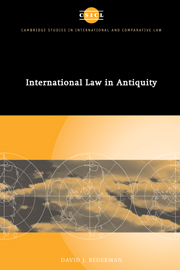Book contents
- Frontmatter
- Contents
- Acknowledgments
- List of abbreviations
- Maps
- 1 A methodological introduction: this study and its limitations
- 2 State relations in ancient civilizations
- 3 Religion and the sources of a law of nations in antiquity
- 4 Making friends: diplomats and foreign visitors in ancient times
- 5 Making faith: treaty practices amongst ancient peoples
- 6 Making war: the commencement and conduct of hostilities in ancient times
- 7 Civilization and community in the ancient mind
- Topical bibliography
- Index
- CAMBRIDGE STUDIES IN INTERNATIONAL AND COMPARATIVE LAW
2 - State relations in ancient civilizations
Published online by Cambridge University Press: 23 October 2009
- Frontmatter
- Contents
- Acknowledgments
- List of abbreviations
- Maps
- 1 A methodological introduction: this study and its limitations
- 2 State relations in ancient civilizations
- 3 Religion and the sources of a law of nations in antiquity
- 4 Making friends: diplomats and foreign visitors in ancient times
- 5 Making faith: treaty practices amongst ancient peoples
- 6 Making war: the commencement and conduct of hostilities in ancient times
- 7 Civilization and community in the ancient mind
- Topical bibliography
- Index
- CAMBRIDGE STUDIES IN INTERNATIONAL AND COMPARATIVE LAW
Summary
The primary assumption of this study is that there existed at certain times and places in antiquity authentic systems of States which were disposed, through their interactions, to conceive of rules of state behavior, norms that we might call today the law of nations or international law. This assumption has been debated quite extensively. Indeed, it goes to the heart of my thesis - that ancient peoples were able to envision exogenous limits on State conduct in international relations. This chapter provides a cursory, and by no means exhaustive, answer to the question whether State systems and international relations existed in the three times and places considered in this book: the ancient Near East (from 1400 to 1150 BCE and 966 to 700 BCE), the Greek city-States (from 500 to 338 BCE), and the wider Mediterranean during the period of Roman expansion (from 358 BCE to 168 BCE). My primary goal here is to trace the outlines of a defensible posture concerning the existence of authentic State systems in antiquity, while, at the same time, giving an overview of the historiographic literature on this subject. Although most of this material will be familiar to students and scholars of ancient and classical history, it is less familiar to international lawyers, and, anyway, it is necessary to cover this ground before any intelligble observations can be made regarding the nature of a law of nations in antiquity.
- Type
- Chapter
- Information
- International Law in Antiquity , pp. 16 - 47Publisher: Cambridge University PressPrint publication year: 2001
- 1
- Cited by



